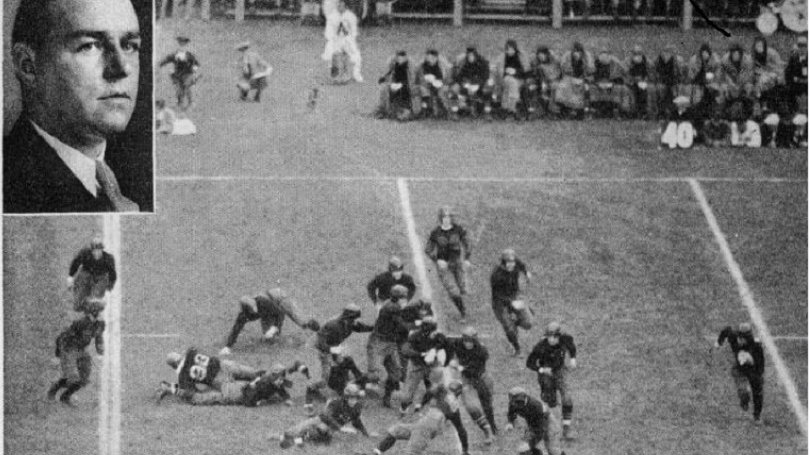
- Public Policy
- Leadership
- Funding
- News & Events
- About the Center
Back to Top Nav
Back to Top Nav
Back to Top Nav
Back to Top Nav
This article is part of a series honoring Dartmouth Alumni who have served in public office and demonstrated their commitment to the ideals of public service, leadership, and civic engagement.
As Eddie Dooley graduated from Dartmouth in 1927, he was known better as a football star than a potential civil servant. At a time when the sport of football was rapidly gaining popularity, Dooley was ahead of the curve in both his performance and his study of the game. He was an All-American quarterback, nicknamed “Death Dooley” for his killer instinct on the field. However, his real lasting legacy on the game of football is the advent of specialist coaches observing the game from high above the field. Dooley was an early pioneer in football strategy whose advancements are vital to the playing of the game today. Contemporary greats like Tom Brady have Eddie Dooley to thank for changing the way that the game is observed, analyzed, and played.
Dooley’s popularity on campus was not only limited to sports, however. He was also a member of the DKE fraternity, Casque and Gauntlet, Arts, Pleides, and Green Key organizations. His frequent involvement in school organizations and institutions would eventually be a precursor to his life in public service.
After graduating, Dooley remained in the sports world, first with the New York Sun newspaper and later as a radio sports broadcaster in New York City. From 1927-1930, he wrote as a feature sports writer for the Sun while simultaneously earning his JD from Fordham College. Throughout his time in sports media and beyond, Dooley maintained a strong relationship with the college, serving as President of the Dartmouth Athletic Council from 1936-1940 and a lifetime member of the Dartmouth Club of New York. During World War II, Dooley also sat on distribution committees for the War and Navy departments.
When Dooley entered the House of Representatives as a Republican in 1957, the US found itself in the throes of the Cold War. The following year, fellow alumnus Nelson A. Rockefeller would become the Governor of New York, giving Dartmouth alums quite a bit of influence on public policy in New York. During his three terms in office, Congress oversaw the creation of NASA, which would become the impetus for the Great Space Race against the Soviet Union. Dooley was also in office at the time of the Watergate burglary of the DNC, which would eventually result in the resignation of President Richard Nixon.
Another extremely important development during Dooley’s three terms was the proliferation of the Civil Rights Acts of 1957 and 1960, which were instrumental in compelling states and municipalities to follow federal court mandates about unjust voter suppression. These two acts of Congress were important steps towards securing African-Americans’ franchise and political agency. In Dooley’s final year in office, the legislation that would eventually become the Civil Rights Act of 1964 originated in the House. Again, this policy was a tremendous victory in the fight for equal civil rights among minority groups in the US.
Three years after leaving Congress in 1963, Dooley became the Chairman of the New York State Athletic Commission. Interestingly enough, he generated a nationwide controversy when he suspended Muhammad Ali’s boxing license to his refusal to enter into the draft. During this time, he also changed certain policies that made sport and athletes more accessible to female sports journalists, who had traditionally been relegated to non-press seating and restricted from dressing rooms.
Among all the great 20th century civil servants to be educated at Dartmouth, Eddie Dooley stands distinguished as an exceptional sportsman and statesman during a turbulent time of American history.
Written by Cameron Poole ’18, Student Researcher for the Dartmouth College Public Service Legacy Project.